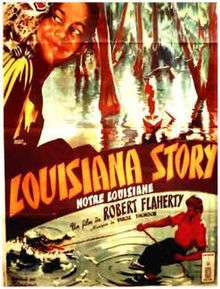Louisiana Story
| Louisiana Story | |
|---|---|
 | |
| Directed by | Robert J. Flaherty |
| Produced by | Robert J. Flaherty |
| Written by |
Robert J. Flaherty Frances H. Flaherty |
| Starring |
Joseph Boudreaux Lionel Le Blanc E. Bienvenu Frank Hardy |
| Music by | Virgil Thomson |
| Cinematography | Richard Leacock |
| Edited by | Helen van Dongen |
| Distributed by | Lopert Films |
Release dates |
|
Running time | 78 min. |
Louisiana Story (1948) is a 78-minute black-and-white American film. Although the events and characters depicted are fictional, it is often misidentified as a documentary film, when in fact, it is a docufiction. The script was written by Frances H. Flaherty and Robert J. Flaherty, directed by Robert J. Flaherty, and was commissioned by the Standard Oil Company.
Plot
The film deals with the adventures of a young Cajun boy and his pet raccoon, who live a somewhat idyllic existence playing in the bayous of Louisiana. A sub-plot involves his elderly father's allowing an oil company to drill for oil in the inlet that runs behind their house.
A completely assembled miniature oil rig on a slender barge is towed into the inlet from connecting narrow waterways. Although there is a moment of crisis when the rig strikes a gas pocket, most of this is dealt with swiftly and off-camera, and the barge, rig, and friendly drillers depart expeditiously, leaving behind a phenomenally clean environment and a wealthy Cajun family.
Conflict and action for the plot is provided by the presence of a giant alligator in the area, which is believed to have eaten the pet raccoon and which is hunted in revenge. There is no individual or organized resistance to the incursion of the oil seekers, even after the (brief, offscreen) disaster, who are unequivocally portrayed as friendly, progressive humanitarians.
The boy, named in the film as Alexander Napoleon Ulysses Le Tour but in the credits just identified as "the boy", was played by Joseph Boudreaux. The film was photographed by Richard Leacock and edited by Helen van Dongen, who were also the associate producers. Original release was through independent film distributor Lopert Films.
Production
The film was shot on location in the Louisiana bayou country,[1] using local residents for actors. However, none of the members of the Cajun family (boy, father and mother) were actually related, and the film does not deal with Cajun culture, the reality of the hard lives of the Cajun people, or with the mechanics of drilling for oil. The story itself is completely fictional. It is therefore unclear why, other than for publicity purposes or out of respect to the then-near-forgotten Flaherty, the film was ever referred to as a documentary, much less why it continues to be.
In 1952, it was reissued by an exploitation film outfit with a new title, Cajun, on the bottom-half of a double-bill with another film called Watusi.[2]
Reception and awards
The film was nominated for an Academy Award for Best Writing, Motion Picture Story in 1948.[3] In 1949, Virgil Thomson won the Pulitzer Prize for Music for his score to the film (which is based on a famous field tape of indigenous Cajun musicians and was performed by the Philadelphia Symphony). Through 2016, this has remained the only Pulitzer Prize awarded for a film score.[4] [5] In 1994, Louisiana Story was selected for preservation in the United States National Film Registry by the Library of Congress as being "culturally, historically, or aesthetically significant". The movie was also in the top 10 of the first British Film Institute's Sight and Sound poll in 1952.
The film is recognized by American Film Institute in these lists:
- 2005: AFI's 100 Years of Film Scores – Nominated[6]
See also
References
- ↑ LIFE. Time Inc. 2 May 1949. p. 137. ISSN 0024-3019.
- ↑ Calder-Marshall, Arthur; Rotha, Paul; Wright, Basil (1963). The Innocent Eye: The Life of Robert J. Flaherty. Harcourt, Brace & World. p. 224.
- ↑ Gevinson, Alan (1997). Within Our Gates: Ethnicity in American Feature Films, 1911-1960. University of California Press. p. 614. ISBN 978-0-520-20964-0.
- ↑ McLane, Barbara A. (2012). A New History of Documentary Film: Second Edition. Bloomsbury Academic. p. 68. ISBN 978-1441124579.
- ↑ Wikipedia list of Pulitzer Prizes for Music
- ↑ "AFI's 100 Years of Film Scores Nominees" (PDF). Retrieved 2016-08-06.
External links
- Louisiana Story at the Internet Movie Database
- Louisiana Story at Rotten Tomatoes
- Louisiana Story is available for free download at the Internet Archive
- Patricia A. Suchy and James V. Catano, "Revisiting Flaherty's Louisiana Story", Southern Spaces (27 April 2010)